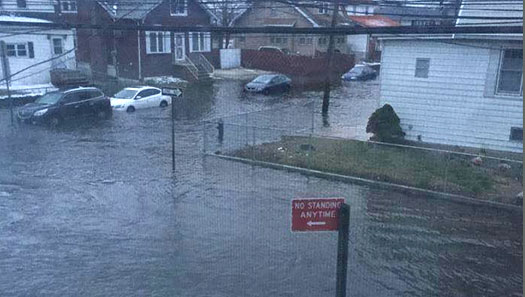File Photo
“In the past year, a number of hurricane and flooding events have occurred across the United States, impacting millions of Americans. These events have once again shown that the flood program is not on stable footing, and that more needs to be done to protect those at risk,” SmarterSafer wrote to Sens. Mitch McConnell and Charles Schumer this week.
By Michael V. Cusenza
A coalition of organizations that scrutinize federal disaster policy fired off a letter to U.S. Senate leaders on Monday demanding that they take substantive action to reform the beleaguered National Flood Insurance Program.
SmarterSafer, which is comprised of conservation groups, taxpayer advocates, insurance interests, and housing and mitigation experts, noted that while the Senate recently slipped into the Farm Bill a six-month NFIP extension in order to avoid a lapse in the struggling program, “continuous short-term extensions do not provide the certainty or the reforms the program needs.”
And the eleventh hour is fast approaching: The NFIP will shutter unless lawmakers pass legislation extending it by July 31.
“Unfortunately, NFIP— which has borrowed over $40 billion from US taxpayers—has now been extended on a short-term basis a number of times in the last year without needed reforms,” the coalition wrote in its missive to Majority Leader Mitch McConnell and Minority Leader Charles Schumer. “The last time NFIP reform was debated, there were 17 short-term extensions and four program lapses— communities and people at risk deserve better this time. They need certainty and a program and options that meet their needs. We urge you to act quickly to pass a longer-term reauthorization that includes meaningful reforms.”
Any sort of long-term reauthorization “must include” the following five reforms, according to SmarterSafer:
Accurate mapping: The Federal Emergency Management Agency must be required to ensure that mapping data has both greater engineering confidence and includes property-level elevation information gathered through Light Detection and Ranging surveys, a proven technique to develop high-resolution accurate maps.
Mitigation: The best way to reduce rates is by reducing risk. While Congress provided additional mitigation funding in its disaster package, there is more that must be done within NFIP to ensure greater investment in mitigation, SmarterSafer wrote. Congress must require FEMA to work with lenders and the Federal Housing Administration to facilitate mitigation loans, to provide more flexibility in Increased Cost of Compliance mitigation funds so they can be used pre-disaster, and to require communities to plan for known flood risks and assess community-wide, nature-based mitigation efforts that are cost-effective and will reduce future flooding.
Continued move to solvency: Congress must continue to move NFIP to fiscal soundness by gradually phasing properties to risk-based rates coupled with mitigation assistance and affordability measures for those who are low-income. For too long, the federal government has masked risk through subsidized rates, resulting in a program deeply in debt to taxpayers.
Consumer choice/Affordability: Congress must clarify current law so that homeowners can choose private flood policies if they find better rates and/or coverage in the private sector. Any reform or reauthorization must include the Flood Insurance Market Parity and Modernization Act. Though the bill merely clarifies current law, it is needed to assure lenders they can accept private policies.
Increased transparency: Homeowners and communities can only make decisions to reduce the potential for flood damages if they have access to information about flood risks. FEMA should be required to make more data available to the public on flood losses, repeatedly flooded homes, and community compliance with the NFIP.

